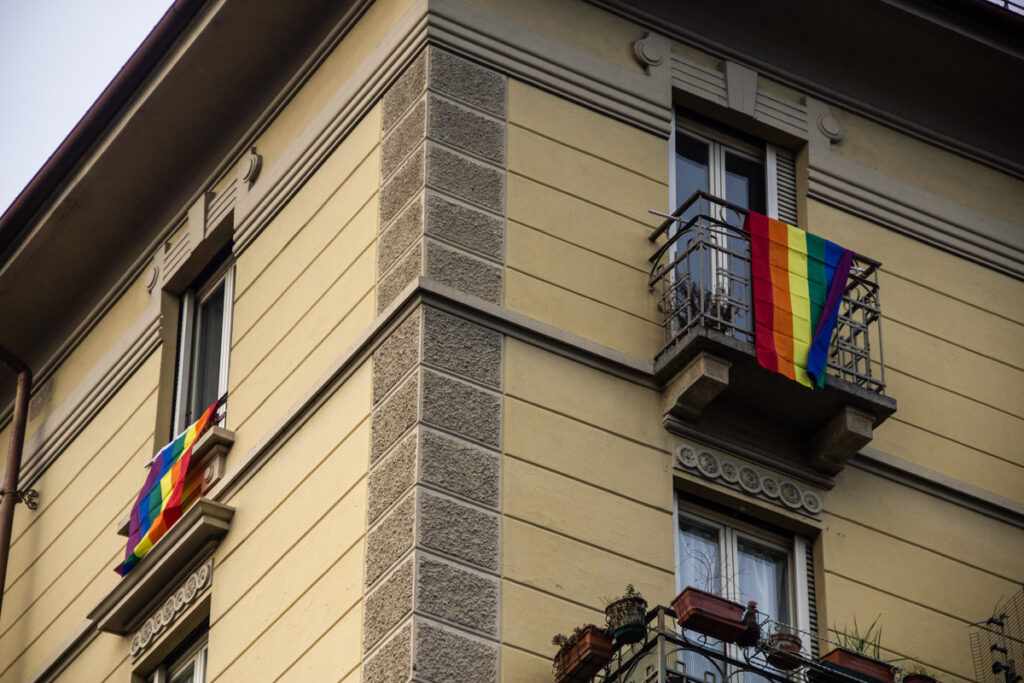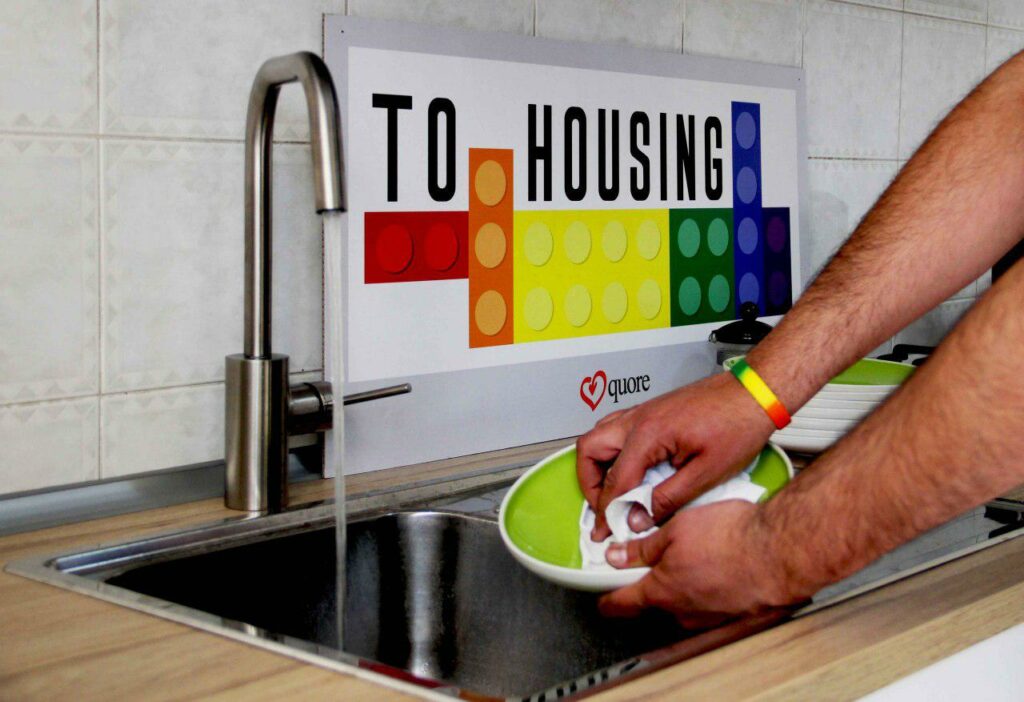In collaboration with our Italian TGE partner, Fondazione Donor Italia, the TGE team interviewed Silvia Magino, cofounder and vice-president of Quore Association, an Italian nonprofit organization that works to defend the rights of LGBT+ people.
TGE: Could you please briefly present Quore Association and the main activities carried out?
Ms. Magino: Quore Association promotes activities for LGBT+ people and works more generally for the achievement of an inclusive society that respects the individual rights of people. Quore has about 40 members, it operates in the territory of Turin and of the region and it is part of the Turin Pride Coordination, UNAR and ILGA.
The aims of the Association, and the fight against discrimination based on sexual orientation and gender identity in particular, are pursued through different actions and methodologies: social communication, training, cultural initiatives, exchange of best practices, dialogue and networking with public and private institutions.
TGE: How has the Association evolved over the years and which are the main milestones achieved?
Ms Magino: The Quore Association was founded in 2007 in Turin and, since then, it has built an increasingly broader project planning to meet the needs of the territory and to improve the living conditions of LGBT+ people. This has allowed not only to reach broader and more diverse targets but also to employ different tools. The growth of the Association has seen the involvement over the years of volunteers and collaborators with different expertise, background and professions.
After a few years of preliminary study, Quore launched Tohousing in 2019, the largest shelter project for LGBT+ people in Italy; the initiative, in addition to providing a concrete response to the many vulnerable people of the LGBT+ community, marked a new project course for the association by giving life to territorial animation and community building projects, awareness desks, prevention and training campaigns.
TGE: The Association is a beneficiary of the TGE network, which allows tax-effective cross-border donations. Why did you decide to take part in the network and which new opportunities has the network brought to the development and to the activities of the Association?
Ms Magino: The theme of economic sustainability of initiatives is central to Quore’s programming, as it is for many Third Sector organizations. We are aware that we have to measure ourselves with a broader scenario and we have to build fundraising strategies that go beyond national borders; this is why we believe that joining the TGE network can be an important resource to open a dialogue in Europe with foundations and grant-making institutions.

Joining the network has already had a first impact in facilitating the relationship with a German philanthropic foundation and we hope to expand the network of European donors in the future.
TGE: As a beneficiary of TGE, do you believe that fundraising initiatives will be more and more European? In your opinion, is the TGE network a useful instrument for Italian non-profits and for their growth?
Ms Magino: We believe that not only fundraising but projects themselves must necessarily have a European profile, especially for issues related to LGBT+ rights, which need even stronger networks to support their advancement. In this perspective, Italian non-profit organizations can benefit greatly from a network such as TGE, especially if they have also developed skills and attitudes to international dialogue.
TGE: The Association is active also in the planning at European level on LGBT+ issues and on the fight against various forms of discrimination. What is the role of Quore both in the Italian and in the European setting?
Ms. Magino: One of the strongest tools for the fight against discrimination based on sexual orientation and gender identity is the involvement of different entities and individuals. The ability to engage and exchange with European actors that have already developed thoughts and strategies in this regard is in fact an important step towards achieving the objectives, both of individual projects and of broader development strategies.
Quore is part of ILGA EU (International Lesbian&Gay Association) and follows its research and development activities. Moreover, for a couple of years now, the Association has opened up to European planning in order to improve the exchange of information and implement development opportunities.
TGE: The theme of welcoming and acceptance is central to your activities, especially in relation to the RARO project, which is dedicated to LGBT+ migrants, who are even more vulnerable due to their sexual orientation. Could you please describe the project and your collaboration with UNHCR?
Ms. Magino: The RARO project aims to promote the integration of LGBT+ migrants, refugees and asylum seekers not only through accompanying actions but also through specific training actions for operators of the local reception system. The program was created to meet the needs of people who, by virtue of their migration path, sexual orientation and gender identity, live a condition of double vulnerability. Given the methodology of intervention and the outcome of the actions, UNHCR has recognized the project as worthy of attention and collaboration. Quore has been able to participate in UNHCR training activities and currently benefits from excellent relations aimed at the exchange of information and practices.
TGE: Quore Association implemented the first social co-housing project for LGBT+ people in Italy (TO HOUSING). How was this project ideated? Were there any other similar projects in Europe that inspired you?
Ms. Magino: As unique experience of its kind in Italy, TOHOUSING innovatively explores an area still little studied, namely marginalization and fragility within the LGBT+ population. There is not yet a systematic data collection about marginalization and poverty of LGBT+ population, but we can refer to a recent survey by FRA (European Fundamental Right Agency), according to which one out of 5 LGBT+ people experience at least once in their life a condition of housing emergency, discomfort or exclusion.

There are many reasons for the exclusion of LGBT+ individuals, from the rejection of their families of origin to the bullying experienced at school, from discrimination in access to the labour market to the absence of services (including housing) or of support able to respond to specific needs.
The LGBT+ people who have requested support over more than two years of work with the TOHOUSING project have to some extent confirmed the reflections that have guided the conception and development of the project. The stories of our guests in fact tell of how the SOGI (Sexual Orientation and Gender Identity) dimension has strongly influenced the course of their lives and highlight discomfort or emotional conditions that have not been completely resolved. In this lies the essence of TOHOUSING, providing tools and opportunities for empowerment in order to process painful events and to rebuild new paths of life.
TOHOUSING was created to respond to these needs and to activate, starting from the housing emergency, paths of autonomy and social reintegration. For this reason, in addition to the temporary residence, the project has structured a model of reception that offers a service of accompaniment through psychotherapeutic counselling, orientation to work and training, health care, legal and daily assistance.
There are not many similar initiatives in Europe and, given the specificity of the Italian context, Tohousing had to structure its own peculiar model. Today the project is listed by Feantsa (the European federation of organizations working for the homeless) as one of the 17 good practices of shelter in Europe (https://www.feantsa.org/en/report/2021/07/08/17-practices?bcParent=27) and we are proud to be part of an international network of people working for inclusion and overcoming inequalities.
To learn more about Quore Association:
Website : http://www.quore.org/en/
Support Quore: https://www.quore.org/en/support/
Want to follow Quore?
Facebook : https://www.facebook.com/quoretorino
Twitter : https://twitter.com/Quoretorino
